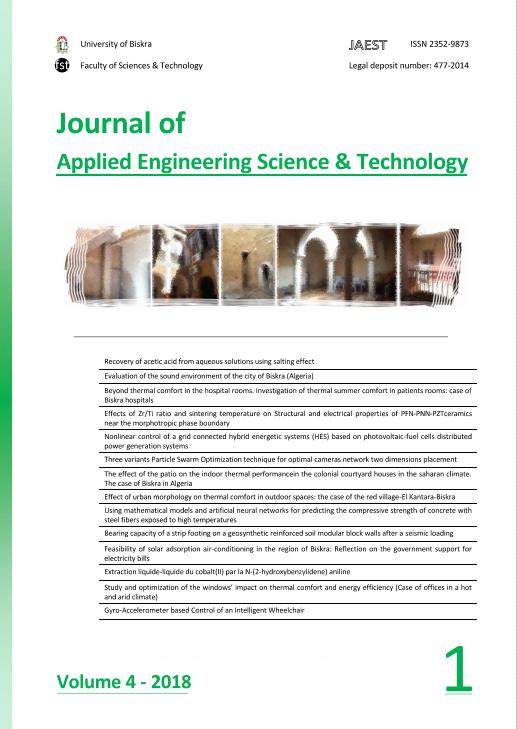Beyond thermal comfort in the hospital rooms. Investigation of thermal summer comfort in patients rooms: case of Biskra hospitals
Abstract
In Algeria, the architectural design of hospitals is unfortunately not subject to clear and specific regulatory thermal strategy, it depends mainly on the architect own approach to the issue of comfort design, materials, etc. This research aims to investigate the present comfort conditions in typical hospital configuration and under specific climate conditions of hot and arid regions. Two different hospital designs have been investigated in Biskra. A main town is southeast of Algeria. The first case study being the oldest hospital in the town, build in the late 30s during the colonial era and renovated recently. The second hospital is a brand new hospital. A series of measurements of ambient air temperature, patient surveys and interviews have been initiated in two typical wards. The results show that thermal comfort sensations in these specific spaces depend not only on architecture, design and typical processes, but also on physiological, psychological and behavioral parameters which widely influence the perception of the patients.
J. Appl. Eng. Sci. Technol. (JAEST - ISSN 2352-9873) is a peer-reviewed quarterly journal dedicated to the applied engineering sciences and technology. The JAEST provides immediate open access to its content on the principle that making research freely available to the public supports a greater global exchange of knowledge.
There is no submission or publication fee for papers published in the JAEST.
Authors who publish in the JAEST agree to the following terms:
- Authors retain copyright and grant the journal right of first publication with the work simultaneously licensed under a Creative Commons Attribution License that allows others to share the work with an acknowledgement of the work's authorship and initial publication in the JAEST.
- Authors are able to enter into separate, additional contractual arrangements for the non-exclusive distribution of the journal's published version of the work (e.g., post it to an institutional repository or publish it in a book), with an acknowledgement of its initial publication in the JAEST.
- Authors are permitted to post their work online (e.g., in institutional repositories or on their website) prior to and during the submission process, as it can lead to productive exchanges, as well as earlier and greater citation of published work (See The Effect of Open Access). Any such posting made before acceptance and publication of the Work shall be updated upon publication to include a reference to the JAEST and a link to the online abstract for the final published Work in the Journal.






